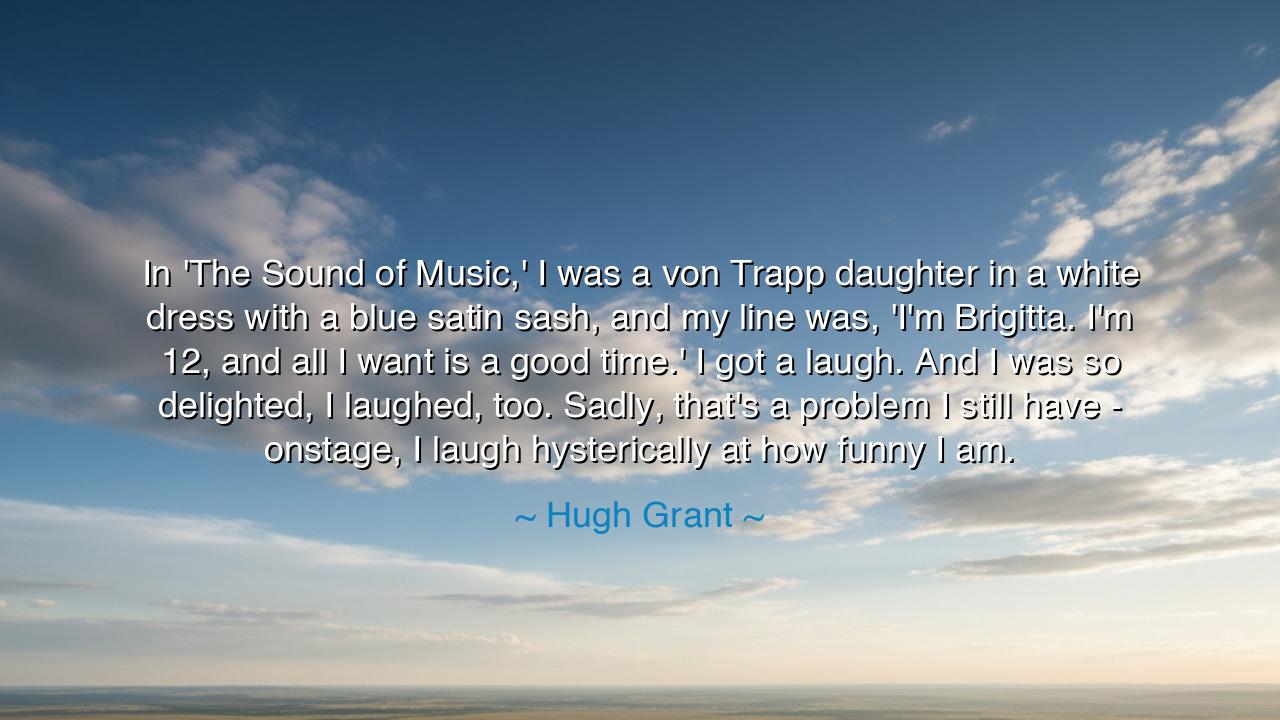
In 'The Sound of Music,' I was a von Trapp daughter in a white
In 'The Sound of Music,' I was a von Trapp daughter in a white dress with a blue satin sash, and my line was, 'I'm Brigitta. I'm 12, and all I want is a good time.' I got a laugh. And I was so delighted, I laughed, too. Sadly, that's a problem I still have - onstage, I laugh hysterically at how funny I am.






The words of Hugh Grant—“In 'The Sound of Music,' I was a von Trapp daughter in a white dress with a blue satin sash, and my line was, 'I'm Brigitta. I'm 12, and all I want is a good time.' I got a laugh. And I was so delighted, I laughed, too. Sadly, that's a problem I still have—onstage, I laugh hysterically at how funny I am.”—speak with both humour and humility, yet hidden beneath their lightness lies an ancient truth: the revelation of self-awareness in joy. Grant, known for his self-effacing wit, unveils here the purity of an artist’s earliest awakening—the moment one discovers the power to make others laugh, and in doing so, tastes the intoxicating mirror of one’s own delight. This is not vanity, but innocence—the kind of innocent wonder that belongs to childhood and to every artist who still remembers the joy of creation before the burden of perfection.
In his words, we hear the echo of laughter as the first form of art. When he recalls his line as young Brigitta, and the audience’s laughter that followed, he describes not just a performance, but a moment of connection, when the barrier between performer and watcher dissolved. He laughed not out of pride, but from the shared energy of that connection. This is the ancient rhythm of theatre itself—the laughter that unites rather than divides. From the amphitheatres of Greece to the stages of London, the artist has always stood between the worlds of order and chaos, drawing laughter from the fragility of human life. Grant’s story reminds us that comedy begins in communion: the recognition that joy multiplies when it is shared.
Yet in that same confession—“Sadly, that’s a problem I still have”—we find humility, the awareness of imperfection that crowns all true artistry. The great comedians and tragedians alike have wrestled with the same paradox: that the performer must feel deeply, but also remain disciplined. To laugh at one’s own wit, as Grant admits, is both a flaw and a freedom. It is the reminder that behind every polished act there still lives the child who first discovered the power of laughter. The ancients might have called this the muse’s mischief—the spark of chaos within order that keeps the artist alive, the imperfection that makes him human.
There is wisdom in this self-mockery. Hugh Grant’s laughter at himself reveals not arrogance but sincerity, for the truest performers never forget their own absurdity. The moment one believes too much in one’s own greatness, the divine fire of humour fades into pride. The comedian and the fool share a sacred duty: to remind the world that it is foolish, and in that foolishness, beautiful. Even Aristophanes, the father of comedy, filled his plays with laughter that mocked both gods and mortals, not to insult them, but to bring them closer to truth. Grant’s laughter at himself carries the same spirit—a recognition that joy and humility must forever dance together.
In the story of his youthful performance, there is also the deeper theme of beginnings, of that first spark that sets the artist’s path. Many great souls have experienced such a moment of revelation. The poet Horace, in his youth, once recited verses before the Roman elite and was laughed at for his trembling voice. Yet that laughter did not break him; it became the sound of awakening. So too for Hugh Grant, the laughter that began in innocence became the foundation of his craft. It taught him that humour, though fragile, is sacred. For laughter is not merely a reaction—it is the heartbeat of recognition, the echo of shared humanity.
From his story, we may draw a lesson both humble and profound: never lose the childlike wonder that laughs even at itself. In every pursuit—be it art, learning, or love—remember the joy of first discovery, when success was not yet calculation but play. When you achieve something that delights others, do not harden yourself with pride or distance; allow yourself to laugh, even at your own delight. For laughter born of sincerity purifies ambition and keeps the spirit human. The world belongs not to the flawless, but to the joyful.
So, my friends, take heed of Hugh Grant’s unguarded truth. Laugh at yourself, but do not forget why you laugh. Let your joy remind you that imperfection is not failure—it is vitality. The artist who laughs keeps his soul alive; the leader who laughs keeps his heart kind; the lover who laughs keeps love honest. Grant’s story is not just a memory of a boy in a blue satin sash—it is a parable of human authenticity. For as long as we can still laugh, even at our own absurdities, we remain connected to the divine pulse of life itself.
Thus, the teaching stands eternal: to laugh sincerely is to live truthfully. Let not the world’s seriousness rob you of that sacred laughter. For it is through laughter that we glimpse eternity’s mercy—that strange, beautiful forgiveness that allows us to be both foolish and magnificent at once.






AAdministratorAdministrator
Welcome, honored guests. Please leave a comment, we will respond soon